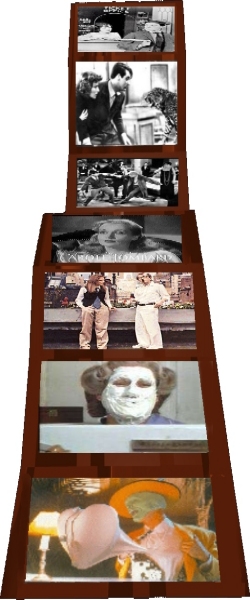
Screening:
MW, 12:30-2:50
Class:
TTh, 12:30-1:50
Room:
Thompson 101
Instructors
Claudia
Gorbman
Padelford
A-504
543-2288
Hours:
W, 10:30-12:30
Kimberlee
Gillis-Bridges
Padelford
A-16
543-4892
Hours:
TTh, 11:30-12:30
Last Updated:
6/1/00
Comments
or queries
|

Midterm
Exam Answers
Section One: Film
Identifications
1. The nation's
new ruler is late to his own introductory fanfare. His office is
above a peanut stand and a lemonade stand.
-
Film: Duck Soup
-
Director: Marx Brothers
or Leo McCarey
2. Eccentric German
psychiatrist instructs the woman that "the love impulse in the male is
manifested in conflict."
-
Film: Bringing Up Baby
-
Director: Howard Hawks
3. Man travels deep
into enemy territory, unaware of the retreat of the entire army he's serving.
-
Film: The General
-
Director: Buster Keaton
4. Trying to impress
his girlfriend, man makes $1 price tage into a $4 price tag on a candy
box.
-
Film: Sherlock Jr.
-
Director: Buster Keaton
5. Trying to impress
his girlfriend, man pretends he's a manager in the department store.
-
Film: Safety Last
-
Director: Harold Lloyd
or Fred Newmeyer/Sam Taylor
6. Trying to impress
the boss's daughter in the kitchen, man dries dishes and kneads dough through
the washing-machine rollers.
-
Film: The Pawnshop
-
Director: Charles Chaplin
7. Woman in very
revealing dress sings "Sister Honky-Tonk." Later she puts on a record for
a suitor, "No One Loves Me Like that Dallas Man."
-
Film: I'm No Angel
-
Director: Mae West or Wesley
Ruggles
8. Man changes clothing
to pose as a tramp on the road, much to the disapproval of his butler,
who knows that poverty is not interesting but a disease.
-
Film: Sullivan's Travels
-
Director: Preston Sturges
9. "British heiress"
is determined to marry a millionaire: "I need him like the axe needs
the turkey." In "romantic" scene on a hill, he proposes as the horse keeps
getting in their faces.
-
Film: The Lady Eve
-
Director: Preston Sturges
10. When detectives
enter their cabin, they pose as a working-class couple in a loud marital
dispute.
-
Film: It Happened One
Night
-
Director: Frank Capra
11. When the local
police have locked them behind bars, they pose as a notorious robber gang;
the woman cons her way out of her cell via a cigarette and an open window.
-
Film: Bringing Up Baby
-
Director: Howard Hawks
12. After a skinny
bearded man emerges from the steam room, a boy's ball bounces into the
main character's shop and helps to catch an escaped thief.
-
Film: The Barber Shop
-
Director: W.C. Fields or
Arthur Ripley
Section Two: Short
Answers (Answers Underlined)
1. The Production
Code was written in 1930, and enforced beginning in 1934.
2. The term for
a consistent character that a given actor becomes through his/her films
is persona.
3. The ex-Postmaster
General who became head of the MPPDA and oversaw the instituting of the
Production Code was Will Hays.
4. The particular
brand of movie comedy that arose from the Depression, the limitations of
the Code, and casting of glamorous stars was called screwball comedy.
5. Identify two
categories of sight gag, as outlined by Noel Carroll. Any two of
the following would be acceptable:
-
mutual interference gag
-
mimed metaphor
-
switch image
-
switch movement
-
object analog
-
solution gag
Section Three: One-
or Two-Sentence Answers
1. Define low
comedy and high comedy. Give one example of each from
any film seen so far. (An example in this case=your description of a particular
scene or moment in a film that illustrates your definition)
-
Low Comedy: Comedy with
little intellectual appeal, but which arouses laughter by jokes, gags,
slapstick humor or physical activity.
-
Examples: Chaplin
kicking his co-worker in the pants in The Pawnshop, Buster slipping
on the banana peel in Sherlock Jr, Susan's dress ripping in Bringing
Up Baby, Charles's tumble over the couch in The Lady Eve.
-
High Comedy: Comedy that
is intelligent, sophisticated, and highly verbal.
-
Examples: Ellie's exchange
with Mr. Shapeley in It Happened One Night, Sullivan's butler's
derision of his boss's posing as a vagrant in Sullivan's Travels,
the chaise-lounge exchange between Charles and Jean in The Lady Eve.
2. Which of these
three scenes does Bergson's theory of the comic account for (correct answers
underlined).
a. W.C.
Fields asks where his newspaper and glasses are when they're in his hands.
b. Johnnie (Keaton)
rescues his girlfriend from the enemy troops by carrying her in a sack.
c. Susan,
unaware that her evening gown is ripped up the back, is scoffing at David
(Cary Grant).
Then, according to Bergson,
what is laughter a "corrective" of? How does it work in one
example you've circled above?
For Bergson,
to be human is to be in touch with the environment and able to adapt to
changes. We laugh when we witness a person's clumsiness, inelasticity,
rigidity, automatism, or "unconsciousness" because we are attempting to
correct his or her behavior and encourage awareness. When viewing
the restaurant scene in Bringing Up Baby, we laugh to alert Susan
to her lack of awareness--she doesn't know her gown is torn--and thus correct
her rigid behavior.
3. What is Noel Carroll's
overall definition of the sight gag?
Carroll defines
the sight gag as visual humor predicated on incongruity. The sight
gag's humor emerges from alternative interpretations of an image or series
of images.
|
 |

